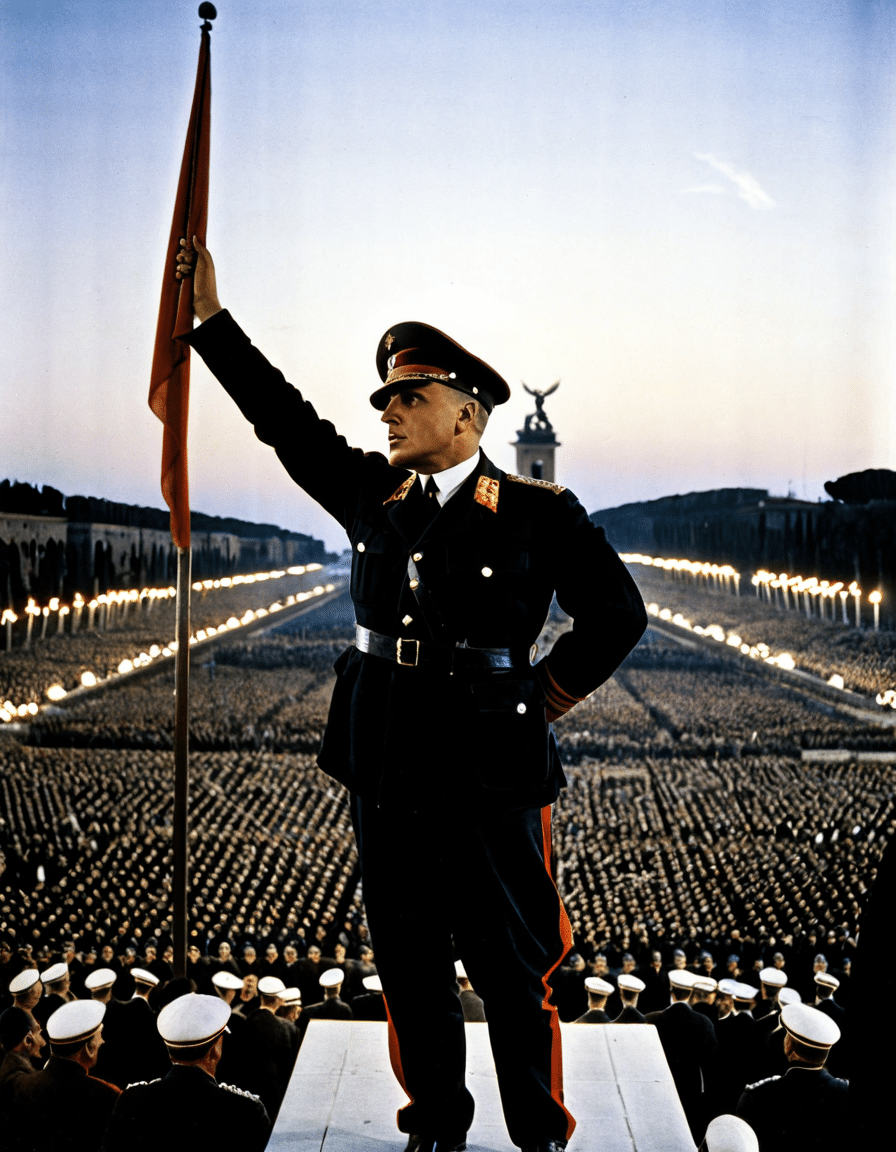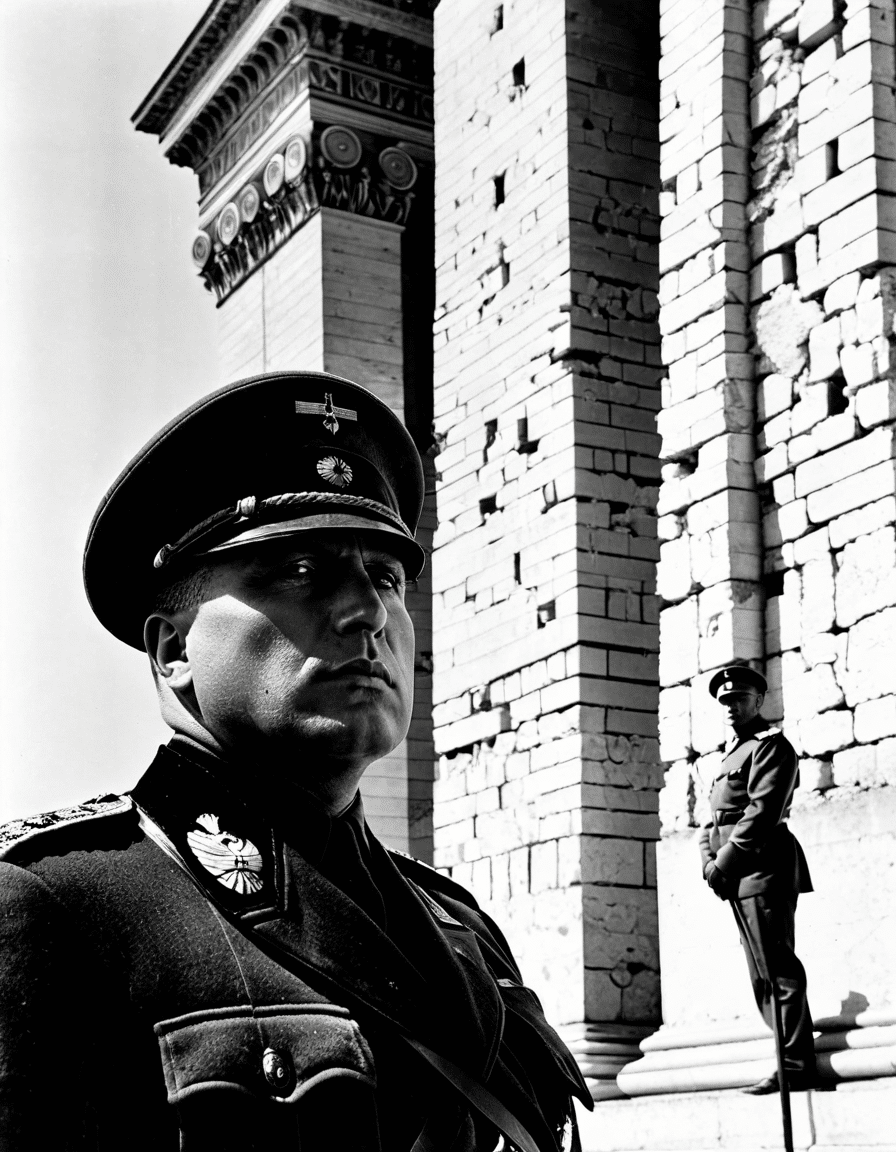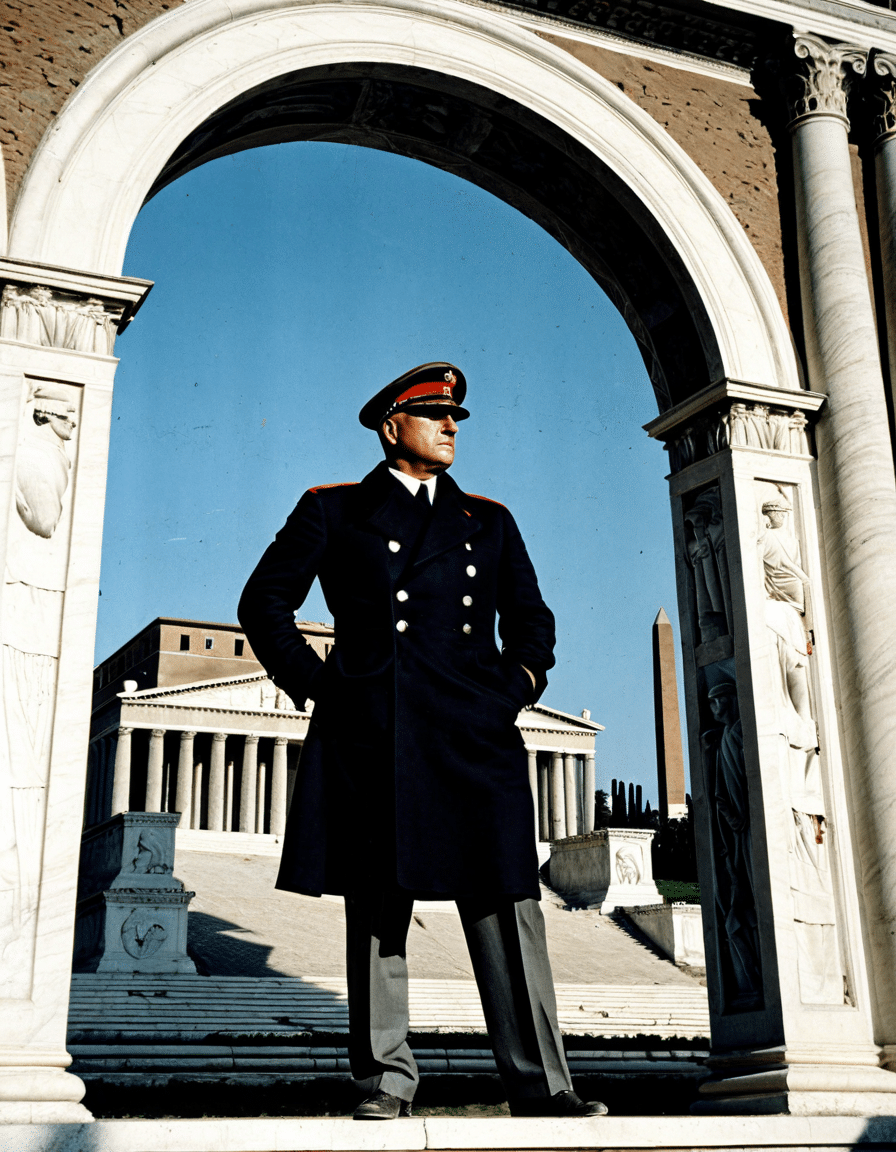Benito Mussolini, born on July 29, 1883, in Predappio, Italy, would transform from a boy with humble beginnings to one of history’s most notorious figures. His father, a blacksmith, and his mother, a schoolteacher, shaped his early worldview, infusing him with a sense of ambition. Mussolini’s formative years were steeped in socialist ideologies, which eventually morphed into his distinct brand of fascism. His relentless pursuit of power and fervent national pride served as the cornerstone of his rise, leading to his infamous dictatorship and the chaos of World War II.
Mussolini’s lust for authority was not born in a vacuum. He was influenced by the tumultuous political landscape of early 20th-century Italy, a playground for radical ideas. His move from socialism to fascism was a captivating, if dark, evolution. And you could say the seeds of ambition he planted grew into a tangled web of power, ruthlessness, and misguided nationalism, ultimately leading his country—and the world—into chaos.
At the heart of his ideology lay an innate belief in the strength of the Italian state above all else. Mussolini’s vision, laced with pride and aggression, directly aimed to revive the glory of the Roman Empire. And boy, did he work hard to make that vision a reality!

Key Moments That Defined Mussolini’s Fascist Ideology
Let’s take a quick tour through the key events that punctuated Mussolini’s dramatic ascent to power:

Cultural Reflections: From Benito Mussolini to the Unlikely Pop Culture Icons
Mussolini’s legacy rippled well beyond the political sphere, influencing art, literature, and even popular culture. His complex character lent itself to various interpretations by artists and filmmakers.
The Legacy of Benito Mussolini in Contemporary Context
Mussolini’s reign remains a polarizing subject, illuminating the darker undercurrents of governance that persist in today’s political dialogues. His tactics involving fear, nationalism, and manipulation draw eerie parallels to contemporary leaders across the globe.
As discussions on identity and governance take center stage, the lessons learned from Mussolini’s rise and fall are vital. Current societies are increasingly aware of the implications of unchecked ambition. Engaging with Mussolini’s narrative serves as a compass for understanding today’s political landscape.
Fascism, unfortunately, doesn’t exist only in history books. It’s a cautionary tale urging citizens to remain vigilant, fostering an environment of critical thought and active participation in defense of democracy. The past is more than a story; it’s a guide to navigating the present.
A Reflection on Power and Its Consequences
In the end, Benito Mussolini embodies a cautionary figure, striking a chord between ambition and tyranny. His life narrates the thin line between charisma and oppression. As we traverse today’s complex political terrain, the echoes of Mussolini’s story resonate—highlighting the responsibilities we hold as citizens to protect freedom and democratic principles.
His legacy isn’t merely a footnote in history; it’s a compelling narrative, reminding us that the pursuit of power untempered by morality can lead to devastating consequences. Whether you’re indulging in award-winning films, streaming riveting documentaries, or analyzing the latest cinematic portrayals, let Mussolini’s story be a reflective lens through which we judge modern leadership.
As we continue to engage with the stories that shape our understanding, let’s keep the dialogue alive, just like the classics that continue to inspire passion in film enthusiasts everywhere!
Benito Mussolini: The Rise and Fall of a Fascist Leader
Fascist Foundations and Unexpected Influences
Did you know that Benito Mussolini was once an avid socialist? Long before donning the fascist mantle, he started his career as a schoolteacher and a journalist, deeply influenced by the Marxist ideals of his time. Interestingly, his passion for power drove him to twist those same socialistic beliefs into a strict authoritarian regime that would pave the way for Italy’s drastic political shifts. This transformation reminds us of the sudden changes we see in pop culture, like the frenzy around Squid Games Season 2, which caught audiences off guard, much like Mussolini’s shift from socialist to fascist.
As Mussolini rose in prominence, he adopted various attention-grabbing tactics. His speeches were often animated and theatrical, reminiscent of performances that could rival infamous figures like Tiny Harris. Just like his distinctive mannerisms, his political style was designed to captivate and energize the masses, proving that charisma often goes hand in hand with influence. But did you know that during World War I, Mussolini was a fervent supporter of Italy’s entry into the war? Just as the assassination of Franz Ferdinand sparked a global conflict, Mussolini’s strategies and decisions shaped the course of Italy’s future, leading to a tumultuous era ahead.
Decline and Defeat
As Mussolini’s regime progressed, it became increasingly totalitarian. However, it would be a series of miscalculations that ultimately led to his downfall. With the shifting tides of the Sun’s destiny (without getting too philosophical), his aggressive expansionism led to disastrous military campaigns. By the end of World War II, Mussolini found himself on the wrong side of history, facing not just military defeat but also backlash from his own people. It’s somewhat reminiscent of the excitement and tension seen in reality shows like Big Brother 26, where alliances crumble and characters face the consequences of their actions.
In life, just like in film adaptations or sequels—think Knives Out 2—the plot twists can be shocking. Mussolini’s final moments were as dramatic as they were tragic; he attempted to escape Italy but was captured and executed by partisans. It served as a grim reminder that power is fleeting, and those who seek it without the consent of the populace often meet dire ends. His story continues to fascinate historians and film buffs alike, echoing through different eras, much like how the values in Blox Fruit evolve with each new addition, be it political or cultural inventions.
Mussolini’s legacy remains a complex tapestry of ambition, power, and inevitable decline, making his life a subject of continuous interest and discussion, much like the future destinies of characters yet to be born into film scripts or the latest trends in society.





